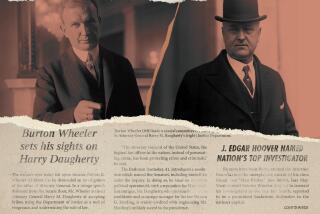Text of Hamilton View: That Is Not Where the Buck Is Supposed to Stop
WASHINGTON — When Rear Adm. John M. Poindexter, President Reagan’s former national security adviser, concluded his appearance before the congressional committees investigating the Iran-contra affair, Rep. Lee H. Hamilton (D-Ind.), chairman of the House committee, offered his critique of Poindexter’s testimony. Excerpts follow:
Your comments about secrecy in government, or “compartmentation,” as you put it, concerned me as it concerns my colleagues a great deal. You have testified that you intentionally withheld information from the President that denied him the opportunity to make probably the most fateful decision of his presidency: whether to divert the funds from the Iranian arms sales to aid the contras. You said your objective was to withhold information from the Congress, apparently, so far as I understood the testimony, without direction or authority to do so.
As many have mentioned, you destroyed the Dec. 5, 1985, finding. You apparently intended to have original documents relating to the contras either altered or removed. You were unwilling to speak candidly with senior Justice and CIA officials about the Hawk missile shipments to Iran, and you kept . . . the secretaries of state and defense uninformed about important initiatives in their areas of responsibility. Now all of us recognize the need for secrecy in the conduct of government. This member has been privileged to receive, I believe, the highest secrets of our government. And I am quite sympathetic to your pleas that secrecy is often needed and too often violated.
Even so, I believe that, in this instance, we have had testimony about excessive secrecy that has had serious consequences for the decision-making processes of government. All of us who work within our system of government sometimes feel impatience with its painstaking procedures. All of us disagree from time to time with the decisions reached. Yet your comment about Congress--”I simply did not want any outside interference”--reflects an attitude which makes, in my judgment at least, our constitutional system of checks and balances unworkable. . . . You began your testimony by saying that the function of a national security adviser is to present options and to advise the President. Yet you told the committees: “The buck stops here with me.” That is not where the buck is supposed to stop. You wanted to deflect blame from the President, but that is another way of saying that that is a way to deflect responsibility from the President. And that should not be done in our system of government.
You testified that diverting funds to the contras was a detail, a matter of implementation of the President’s policies. And, you felt that you had the authority to approve it. Yet, this was a major foreign policy initiative, as subsequent events have shown, with very far-reaching ramifications. And this member, at least, wonders what else could be done in the President’s name, if this is mere implementation of policy.
As my colleague, Mr. (Dick) Cheney (R-Wyo.), said yesterday, the secret methods you chose to determine and to implement policy were also self-defeating. Both Mr. (former National Security Adviser Robert C.) McFarlane and Lt. Col. (Oliver L.) North have acknowledged to these committees that it would have been better to continue the public debate to seek contra funding.
Both the contra resupply effort and the Iran initiative were highly controversial. Decisions were made by only a few people. Many experts in the government were not consulted who should have been. Members of Congress were not informed. Contacts with high officials did not take place. Information was compartmentalized. Decisions were made in secret, and discussion about them was limited.
May I suggest to you, sir, that this approach did not and will not work. You cannot gain and sustain the support of the Congress of the United States and the American people for significant foreign policy decisions when they are uninformed. Secret means employed on behalf of the policy undermined its success, and when revealed, in my judgment, contributed to its failure.
More to Read
Get the L.A. Times Politics newsletter
Deeply reported insights into legislation, politics and policy from Sacramento, Washington and beyond. In your inbox three times per week.
You may occasionally receive promotional content from the Los Angeles Times.









